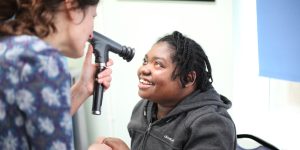Join a powerful, unprecedented alliance for better eye health for all.
Join IAPB-
Choose an alternate language here
In the goal to address avoidable sight loss, WHO has recognised that there are many under-served groups who suffer eye care inequalities. Amongst these are people with learning disabilities (intellectual disabilities).
Here the charity SeeAbility offers a blog on some good news for children with learning disabilities in England, and thoughts on how we can all strive to deliver a more equal right to sight for this patient group.
“People with learning disabilities face issues such as discrimination, institutionalisation, poverty and poor health. Often those health issues are completely avoidable, but come about through lack of adjustments or access to the early, preventative healthcare they need.
It’s not so well known how significant eye care issues are for people with learning disabilities. They are ten times more likely to have a serious sight problem than other people and six in ten people will need refractive correction.
Although estimates vary, according to one recent study there are 107 million people globally with learning disabilities, so these are not insignificant numbers of people who deserve good eye care and attention to their needs.
Even in health systems in higher income countries, the lack of targeted and failsafe programmes means many people with a learning disability don’t get the basics of an eye test or the glasses they need.
Time and again research shows that people with learning disabilities are missing out on simple, low cost eye care that could transform their lives and save their sight.

At SeeAbility we have a commitment to help transform eye care for people with learning disabilities. Our passion is making inclusion a reality and helping people to be able to see is a huge part of that.
For the past decade our clinical team has been delivering a full sight testing service (eye examinations), dispensing glasses, and writing user friendly reports for parents and teachers of children with learning disabilities in special schools in London.
In England, 4 in 5 children with more severe learning disabilities attend special schools and our programme, and other research, has found half of children have a sight problem – most often the need for glasses.
We found over 40% of those children had never had any eye care and only 1 in 10 had been to a local optician, which tells you something about the challenges these children experience.
So we were absolutely delighted when last month the NHS in England, backed by the government, announced it was going to revive a programme of work to offer an eye care service in every special school.
This was the culmination of years of campaigning, including support from organisations such as IAPB in showcasing the difference this type of outreach service can make. As plans are laid, this will target 165,000 children who will be at most risk of a sight problem – not just life changing but undoubtedly sight saving too.
Other areas of the UK we know are watching, and this blog offers the opportunity for the news to reach international ears and eyes too, and so consider similar programmes that mean children and adults with learning disabilities do not miss out.
In England we aren’t resting on our laurels as there continues to be much work to do. For example what happens when children become young adults and leave special school – community pathways are also needed.
Empowering people with learning disabilities is crucial too.
With our Eye Care Champions programme, we are employing people with learning disabilities and autism, reaching out on the ground to many thousands of people with learning disabilities, their supporters and professionals, with the message of being ‘eye care aware’. And our easy read accessible information on eye care is available free to download from anywhere in the world!
In practice there is always going to be a need for a combined effort – not just in accessibility and outreach programmes but in challenging assumptions, raising awareness and making sure that eye care professionals feel confident and have the skills to support people with learning disabilities. Often all people need is just additional time, reassurance and good communication.
This is a human rights issue. Anyone with a learning disability who hasn’t been given the chance to see clearly or has suffered avoidable sight loss, is being robbed of quality of life and independence.
So let’s be ambitious so children and adults with learning disabilities get the sight tests and preventative eye care they need, as everyone deserves an equal right to sight.
Find out more: www.seeability.org/eye-care